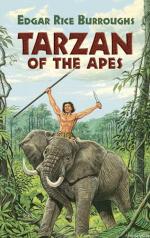|
This section contains 744 words (approx. 3 pages at 300 words per page) |

|
While Burroughs reiterates the ideas of the "noble savage" — the possibility of natural goodness, strength, and superiority inherent in mankind even though brought up in violent Nature— and the evolutionary progress of civilization, including its less praiseworthy manifestations, he also comments upon "the rise of civilization, during which mankind gained much in its never-ending search for luxury; but not without the sacrifice of many desirable characteristics, as well as the greater part of its liberty." The Burroughs books are escapist literature in many senses, for not only do they provide a means of escape from the harsh, real world (of a Depression and two world wars — the pulp magazines, after all, were a mass entertainment medium equivalent to modern television), but they also celebrate, like American writers such as James Fenimore Cooper, Mark Twain, and Ernest Hemingway, an escape from the world of conventional and...
|
This section contains 744 words (approx. 3 pages at 300 words per page) |

|




